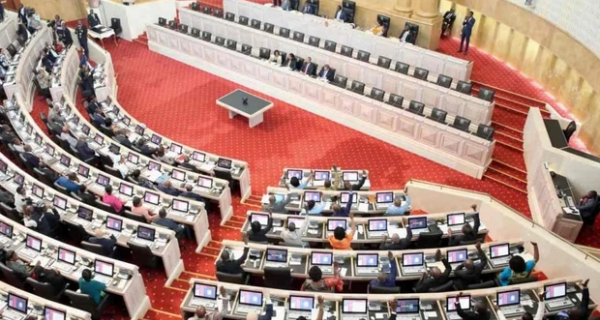The performance of the National Assembly during the second parliamentary year of the 5th Legislature, which ended on 15 August, “was markedly negative, because this time the Angolan parliament has not yet managed to assert itself at institutional level”, stated the president of the parliamentary group of the National Union for the Total Independence of Angola (UNITA), Liberty Chiyaka.
According to the deputy, the Angolan legislative body has not yet managed to assert itself as a sovereign power with its own identity, separate and independent from the executive branch, capable of interpreting and affirming the sovereign will of the people in each legislative act.
In a press conference to review the second parliamentary year of the current legislature, Chiyaka said that the parliament continues to be subordinate to the will of President João Loureço, referring to the plenary session of October 2023, which did not create an ad hoc committee on the process of indictment and impeachment of the President, in “violation of the Constitution”.
“This time, in terms of legislative initiative, the National Assembly has not yet established itself as the legislative power par excellence of the Republic of Angola, since its legislative production on its own initiative has been zero,” she stressed.
She stressed that only the UNITA parliamentary group presented and had one bill approved, and that all other initiatives were by the holder of executive power (the President), considering that during this period there was more diplomacy and institutional political marketing than legislative production.
There was more concern with appearance than with compliance with the Constitution, respect for the democratic regime and effective monitoring of governance acts, said Liberty Chiyaka, stating that the few parliamentary hearings “were mere exercises in institutional propaganda, with no impact on governance practices.”
“Nor was a parliamentary commission of inquiry set up to investigate the numerous complaints and claims from citizens regarding human rights violations, abuse of power and corruption on the part of public office holders,” she noted.
The “negative performance” of the National Assembly “gained a new dimension” with the approval, by the MPLA parliamentary group, of the new administrative division of the province of Luanda, “an act that insults the intelligence of citizens and disfigures the country’s capital”, concluded the UNITA politician.
The president of the Angolan National Assembly, Carolina Cerqueira, said, in turn, that the parliamentary political cycle that ended this Thursday was marked by the “healthy dynamics” of the democratic political debate.
Despite the antagonisms and different ideological positions, the political differences sometimes gave rise to heated debates, “in a dialectic that was sometimes more extreme”, but, she noted, (the debates took place), in most cases, “within the scope of the regulatory and ethical canons that this assembly demands”, she stressed, in the solemn closing session of the second legislative session of the 5th Legislature of the National Assembly.
During the second parliamentary year (2023-2024) of the current legislature, parliament approved 18 laws, most of which were initiated by the President, and 41 resolutions have already been published in the Official Gazette.
The third parliamentary year (2024-2025) begins on 15 October with the President's State of the Nation address.







